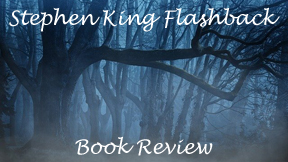If a 787-page epic that Stephen King spent three years writing can be underrated and overlooked, “Insomnia” (1994) is it. Long enough to be an epic but without worldwide stakes like “The Stand,” and not emotional enough to be a lump-in-your-throat classic like “Bag of Bones” or “Duma Key,” “Insomnia” is nonetheless worth reading. You won’t have to set aside three years like King did, but set aside at least three weeks.
“Insomnia’s” strength is in the down-to-earth portrayal of septuagenarian widower Ralph and his sweet budding relationship with longtime friend and widow Lois, and their adventure that skirts the edge of a supernatural alternate realm. Before retiring, Ralph worked a blue-collar job and now lives in half of a rented duplex in mid-sized Derry, Maine.
He’s as normal as can be, and that includes his insomnia, which is not uncommon for his age. He can be bone-tired but not remotely sleepy. He falls asleep fine, but wakes up earlier each night, and he doesn’t dream.

King sometimes isn’t the most direct writer, for better or worse. The thematically and narratively meandering and slow nature of “Insomnia” is often to its credit, though. Instead of entering the alternate realm via dreams, as you might think, Ralph experiences it parallel to his perpetual waking state. That adds a certain groundedness.
About abortion, sort of
Thematically, “Insomnia” is directly (seemingly) about abortion. Popular feminist speaker Susan Day (not to be confused with the actress) is coming to town, thus riling up the pro-lifers and then the pro-choicers, in an endless spiral. Ralph has insider knowledge that a local wife-beating nut, Ed, plans violence at the rally. People Ralph cares about – like Ed’s ex, Helen, and her infant daughter – might be in the line of fire. Ralph has to do something.
King tips his hand as pro-choice as he gives a voice to both points of view – and also puts up caricatures on both sides, achieving a sort of ugly balance that shows he hates the whole thing. But ultimately the author is more engaged in characters, and he uses life-versus-choice as a wider philosophical debate, on a wider canvas.
It’s no accident that “Insomnia” features not only Ralph and 60-something Lois, but also a supporting cast of Derry park chess and card-game players who are all retirees. King was in his 40s when he wrote the novel, but he was thinking about the third act of life. He writes a grand meditation on aging, “one last grand adventure,” contentment, and passing on the baton to the next generation.
King’s world-building about levels of reality just outside our own (hinting that the top, unreachable layer is the realm of God) is creative but muddled as it’s explained to Ralph via two supernatural middle-managers. They have a rivalry with a pure jerk in a different department, the one responsible for Random deaths.

There’s an inherent playfulness to this set-up, but King doesn’t want to be flippant or insult any religions. But he also doesn’t want to be serious by either adhering to a religion’s views or outlining a new religion. That’s where the muddled nature and lack of maximum impact comes from.
Taking – and treasuring — its time
I found the book’s slow-burn buildup quite good. But then the action-oriented middle segment featuring life-versus-choice battles in the real world, plus jaunts into the bordering reality, are a lot while also being not enough.
I wanted more of Helen and daughter Natalie, who are so important to Ralph (and him to them). Yet there are surprisingly few interactions except when Ralph is doing something heroic for them. Non-traditional or alternate takes on the abortion debate would’ve enriched the book, or made it more controversial, but King simply isn’t in the mood to risk offense on any level.
When it’s just about Ralph and Lois and their fellow retirees, though, “Insomnia” is in its comfort zone – and it’s in this zone for much of the first half, plus the emotionally effective ending. It’s a little weird that “Insomnia” is never buzzed about, since it’s a doorstop King novel that he spent so much time on.
Even weirder is that it’s never been made into a film, nor is ever talked about as a potential project. Then again, maybe not – the main characters are old people, and that’s not a sought-after demographic. But everyone has value, even (and in some ways especially) when they are past their physical prime. At least the form of the novel allows King an avenue to express this in a heartfelt way.
Did he need 787 pages? No, but then again, maybe we all need to slow down and not rush on to the next thing.

